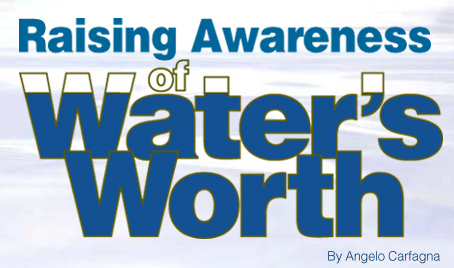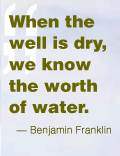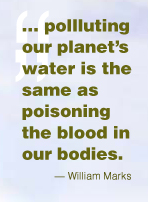

|
|

William Marks, BS’73 (M), already knew the value of water when he began studying at Fairleigh Dickinson more than 30 years ago. As a child, he had helped his father dig a well for the family farm, nearly drowning in the process but gaining an appreciation for the power of water. It wasn’t until a fateful spring morning, however, on the way to class, that he truly began to understand how humans could radically alter this life-giving force. |

|
Riding his motorcycle to the University, Marks crossed a bridge over the Whippany River and noticed hundreds of fish floating belly up. His curiosity aroused, he pulled off the road and began hiking up the river to find the source of the trouble. After several miles, the environmental sleuth saw an assortment of heavy equipment, which was being used to dam the river and alter its course for a new highway. Marks theorized that construction of the new channel stirred up sediments and depleted the oxygen level in the water, thus creating a “kill zone.” Marks was eager to see what investigators would conclude. After several days, however, they were all at a loss to explain the fish kill. That’s when the fledgling clean-water crusader called a newspaper reporter and helped solve the mystery. “This fateful beginning led me to many other waterway adventures and pollution investigations,” he says. Described by some as a “pollution bounty hunter,” Marks would take water samples and pictures of factories polluting. As a student, he was the first person in the United States to test and succeed with a federal case against a polluter using an 1899 law that many thought had been superseded. As a result, Marks and an associate were rewarded with half of the fine in federal court. While at the University, Marks received college credits for his water activities and an FDU grant to do water research. But more important was his education on how one person could make a difference. 
“This taught me about the interconnections of ecosystems, society, science, economics, the legal system and the media,” he says. “Many friends, and even my parents, thought I was wasting my time trying to bring about change. Today, we have organized groups of citizens all across America who travel up and down rivers and bays looking for pollution.” Marks realizes the stakes couldn’t be higher. “The one thing I have come to know is that polluting our planet’s water is the same as poisoning the blood in our bodies.” Holy WaterA well-known water expert and water advocate who has testified before Congress and been featured in national media including CNN, Marks is the author of The Holy Order of Water. The widely acclaimed book describes water’s biological, historical, environmental and spiritual significance, along with Marks’ lifelong relationship with H2O. “This is a philosophical/spiritual/healing book that deals with the realm of water on many levels,” he says. 
The book has been heralded by such people as Walter Cronkite and actor and founding president of the American Oceans Campaign Ted Danson, who said, “Readers won’t find a more intimate, spiritual and informative look at what is without question the world’s most vital and versatile resource.” While Marks labors exhaustively to present the importance of water to us individually, the alarming dangers to our collective welfare particularly stand out (see “Water Wars Looming”). Some alarming notes:
Marks further describes the proliferation of chemicals and waste polluting our water, as well as the increasing battles over water rights. Pointing out that water “has flowed through every life form since the very first creation of life, and that over billions of years has created an environment on Earth hospitable to higher life forms,” he laments, “We are reversing a lot of the work that took water billions of years to accomplish.” If we’re going to overcome these incredible problems and challenges, it will be due in large part to the perseverance and persistence of people like Marks. Syndicated columnist Gordon Bishop once called him a “breath of fresh air” who has the “guts to put his life on the line to save the Earth from reckless abuse and destruction by a human race out of control.” A Baptism of SortsMarks was raised on a farm in the small town of Towaco, N.J., where he first developed a kinship with water. “Early on, I was mesmerized by water, and enjoyed playing in the stream of water that flowed across our farm.” When the shallow well that was the family’s main water source went dry, Marks, his brother and his father dug a new one. The experience proved pivotal. “That was my first awakening as far as groundwater is concerned. It was amazing to get a peek at what is beneath the ground we walk on.” At one point, Marks was almost submerged by the bubbling water until his father could rescue him. He remarks proudly that the well brought much joy and security to the family, and it never went dry. At Fairleigh Dickinson, he majored in business management and starred on the lacrosse squad. Once he began receiving media attention for his research into river pollution, the University supported him with a grant and office space. “This provided crucial support for my extracurricular environmental work and gave me modest financial freedom and vital support tools.” FDU also provided him credit for his water research. Marks says he still enjoys visiting the University and remains in contact with several classmates. In 2002, he spoke at the College at Florham. Interestingly, Marks later met and grew close to Fairleigh (Dick) Dickinson, Jr., the son of the University’s namesake. “I was involved with various environmental projects with Dick on Martha’s Vineyard and St. Croix. We also went sailing together in St. Croix. It was inspiring to sit and philosophize with him for hours on end, and to hear stories about how his father earned a fortune through Becton Dickinson and helped found FDU.” Dickinson is among the friends thanked in The Holy Order of Water. After college, Marks worked as an environmental analyst for the city of Newark, but he soon grew unhappy. “When I tried to clean up a couple of Newark’s industrial water polluters, I was told to back off. The reason given was that if polluting industries started being shut down, were forced to move or stay away because of strict enforcement, there would be less money for the city’s government.” 
Marks then had a vision for a particularly close encounter with nature: a 7,000-mile horseback trek across the country. He titled his escapade a “Ride for Nature” to help bring attention to nature’s plight. His odyssey began in San Diego in 1976 and zigzagged over 20 months through 23 states, ending in Maine. Along the way, Marks endured being stranded without water, vicious storms, a snake wound and horses that tumbled out from under him. He says, though, what he remembers most “are the people I met, and the scarcity of wildlife, the depleted ecosystems and the lack of unpolluted, free-flowing waterways.” He adds that the two years spent living “intimately with nature gave a particular substance to my life.” Marks eventually settled in Martha’s Vineyard, Mass., where he founded Vineyard Environmental Protection Inc., the island’s first state-certified water testing lab, and Vineyard Environmental Research Institute, which conducted studies on acid rain, wetlands and coastal erosion. He also founded a publishing company, WEM Publishing, Inc., which established Martha’s Vineyard magazine and Nantucket Journal (today known as Nantucket), and a local cable television talk show. In the 1990s, he sold all his business interests to focus on writing about water. Healing PowersMarks devotes significant space in his book to the potential healing powers of water; powers that he used to heal himself after experiencing a heart attack. Afterwards, he suffered from a condition called ventricular tachycardia, during which he would experience life threatening accelerations of his heart beat. He was cardio-converted (his heart was jolted) with electricity on three occasions in order to save his life. Marks used hydrotherapy and a self-researched nutrition and healing regimen that today has left him completely free of heart problems. “My cardiologist found it difficult to believe in the way I healed myself,” he says. “He told me I would be on heavy medication for the rest of my life. But I have taken no medication for many years now.” He knows there are skeptics, but he maintains, “Our heart and adrenal, digestive, thinking and blood circulation systems depend on body water. The quality of various waters and their electromagnetic compositions are now presenting us with new avenues for healing. In Europe, insurance companies pay for their clients to receive healing water treatments. It is only a matter of time before the same happens in the United States.” Today, though, Marks says it takes some effort to even get a good glass of water. “This is the most important thing you can put in your body. I don’t care what you do as far as exercise and food intake. If you’re not properly hydrated with good water, your body, mind and spirit will be short changed.” Marks believes good groundwater is usually superior to bottled water, which, he says, could be merely refinished water from a public supply or could sit on a shelf for a year and absorb the chemicals from the plastic containers. He advises people to drink about eight glasses of water a day and “be conscious of finding the best quality water available. This may take a little reading or the asking of questions, but your health, well-being, mental and emotional attitudes and many other things depend on it.” Going with the FlowSince The Holy Order of Water was published in 2001, Marks has been traveling, speaking, doing media interviews and “connecting with an ever-wider network of people involved with water research.” He now is writing a film treatment for a movie about his horseback trek; writing two other books related to water — one nonfiction, the other a novel; writing a short story about growing up in Towaco for the book Small Town USA — due out this summer; writing three pieces for The Water Encyclopedia, due out next year; and helping with the research for the upcoming book History of Wind Power on the Cape and Islands. Marks urges everyone to help answer the challenge of preserving safe water. “Just say in your mind each day, ‘I can help do this!’ Try and do something in the interest of water each day.” Marks points out that water is the dominant substance on the planet, and makes up about 70 percent of our bodies and approximately 85 percent of our brains. Its future is linked with our very survival. He adds, “In time, people will discover that forming a conscious connection with water will open them to a deeper understanding of themselves and the world through which water flows.” |
|
Water Wars Looming | Is Desalination the Answer? FDU Magazine Directory | Table of Contents | FDU Home Page | Alumni Home Page | Comments |
|